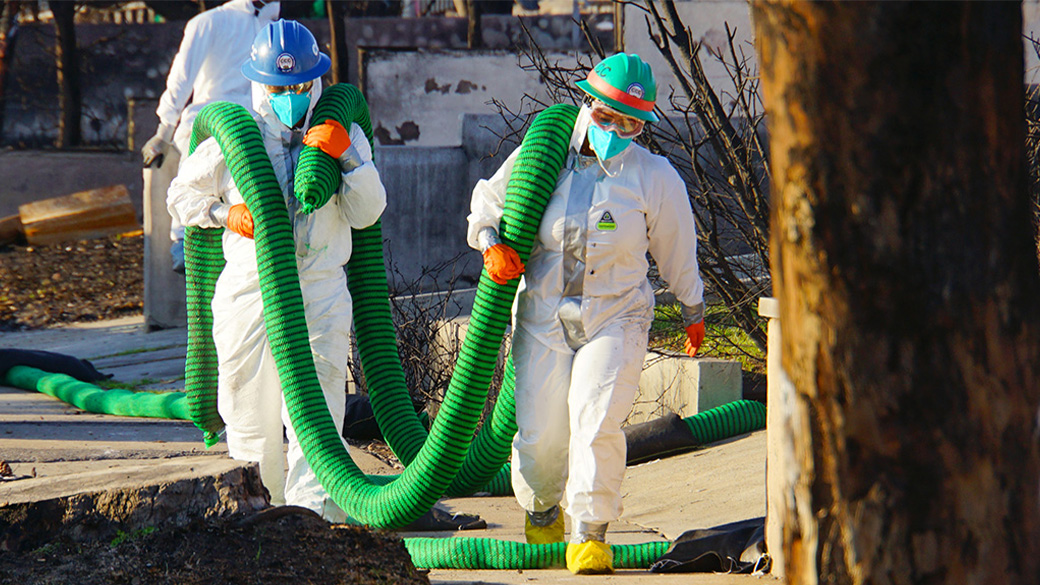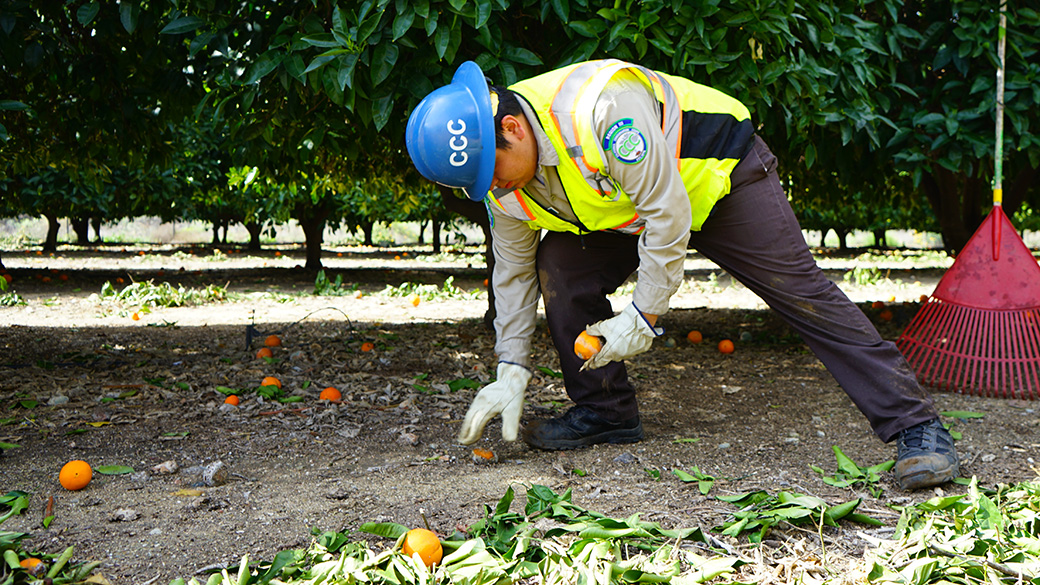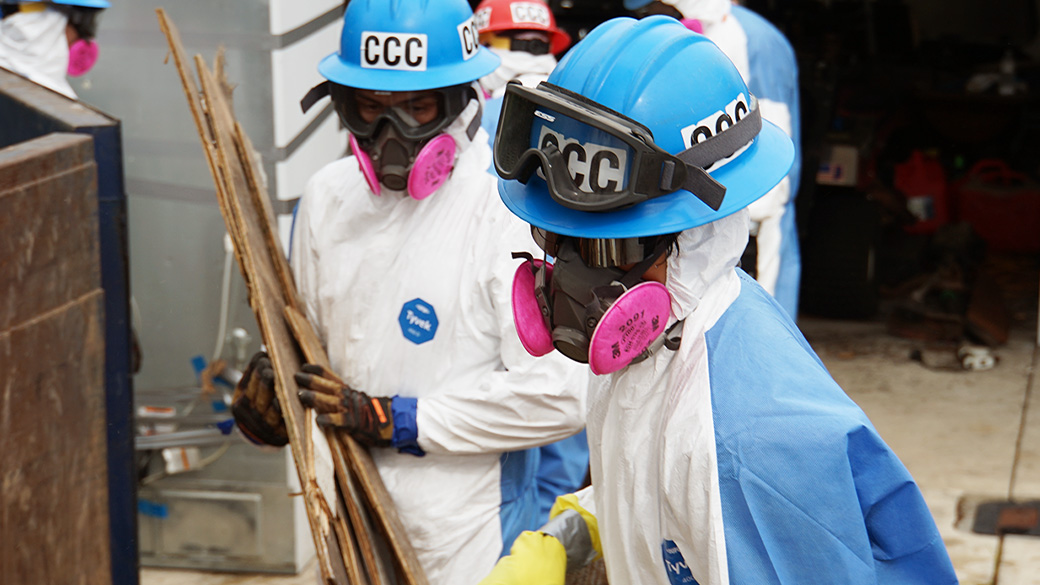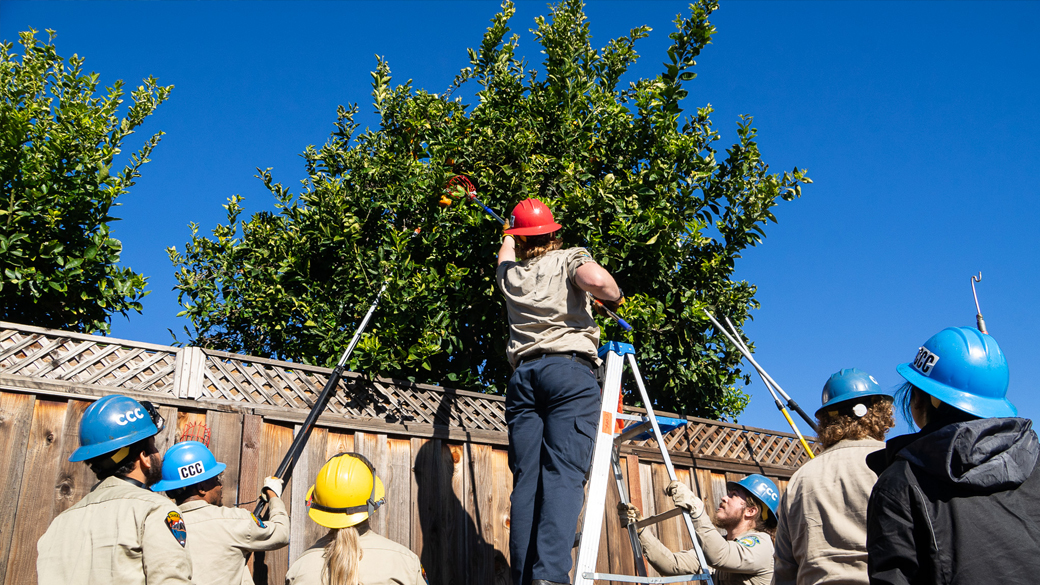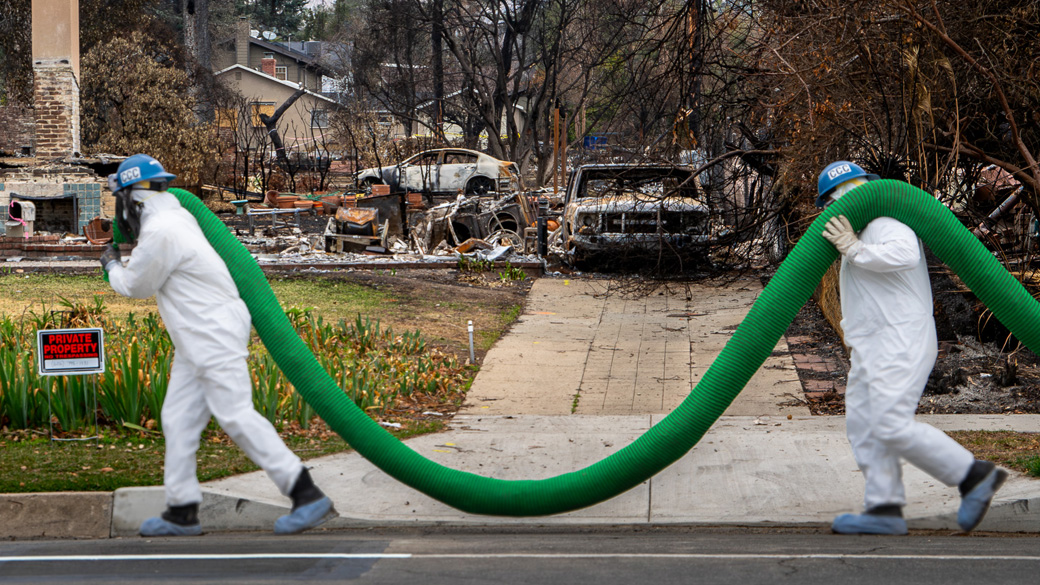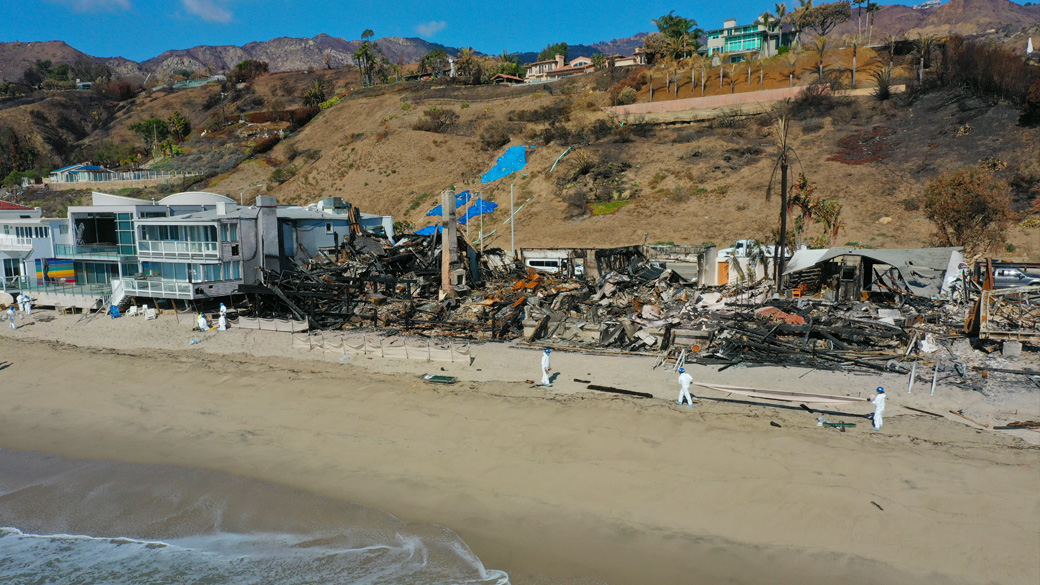Emergency Response
Answer the call!
Watch CCC’s Emergency Response Playlist to see recent dispatches.
Gear UP
Each day, Corpsmembers gear up to make the world a better place. Check out what tools they use to make an impact and picture what life is like when dispatched to an emergency!
Respond to Emergencies

Camp Support
The California Conservation Corps regularly mobilizes to provide assistance to our local, state, and federal partners by staffing and supporting base camps in times of emergencies. Typically, these camps are associated with major wildfires. Camps may also support watershed protection, flooding, and pandemic responses.
Corpsmembers on resource crews (essentially all non-fire or culinary crews) leave their regular project sites and report to base camps operated by CAL FIRE, U.S. Forest Service, Bureau of Land Management, and other agencies. These camps are often located in the most rural places of California, with limited to no cellular service. Base camps may also be stood up at county fairgrounds or other publicly available facilities.
Corpsmembers assigned to staff base camps will work as a crew in a variety of roles and settings. On fire camps, there is typically always a crew supporting the refrigerated unit, supply unit, and kitchen unit. Tasks may vary from fire to fire and camp to camp, but the work is to help support fire operations and make life easier for firefighters working to slow and stop the fire’s spread.
Camp Support
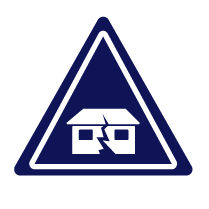
Earthquake Response
In the wake of damaging earthquakes, Corpsmembers may be called upon to assist in the cleanup response and first responder support.
The CCC has long been involved in earthquake cleanup and recovery efforts since the 1983 Coalinga earthquake. We distribute food, water, and other supplies to residents; clean up debris; dismantle hazardous chimneys and walls. The CCC also assists with shelters managed by the Red Cross, and we staff disaster assistance centers.
The CCC began recovery work the very next day following the 1994 Northridge earthquake in Southern California. Corpsmembers devoted 170,000 hours to dismantling hundreds of hazardous chimneys.
With the help of a subsequent federal grant, the CCC hired nearly 200 young people from areas directly impacted by the quake.
Earthquakes happen without warning. CCC response capabilities can mobilize quickly and work with those agencies needing critical resources to help communities impacted.
Earthquakes
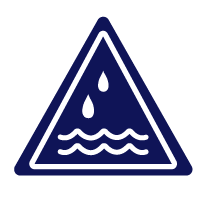
Flood Response
Corpsmembers are the state’s “boots on the ground” when the risk of flooding and damaging homes and property rises, the CCC responds.
All Corpsmembers are trained in flood fighting techniques, as outlined by the Department of Water Resources. Training includes techniques for properly filling and placing sandbags, protecting hillsides, and ensuring that crews are ready to respond when flooding occurs or severe winter storms are on the horizon.
Flood prevention and flood fighting may also include:
- Debris removal
- Levee reinforcement
- Boil containment
- Filling and stockpiling sandbags
- Sandbagging to protect buildings and structures
- Hillside stabilization
- Limited levee patrol
- Evacuation assistance
- Wave-wash protection
Corpsmembers have protected property and homes during nearly every major flood event in California since 1976.
Floods

Hurricane Recovery
CCC crews have deployed multiple times to Florida, as well as the Tri-State area, to assist local communities in recovery from hurricane and storm damage. This includes mucking and gutting homes, hazard tree removal, and tarping of properties.
- 2017: CCC responded to hurricane events in Texas, Puerto Rico, and St. Thomas.
- 2005: A CCC task force deployed to Louisiana after Hurricane Katrina
- 2018: Crews completed hazard tree and debris removal following Hurricane Michael
- 2022: Crews helped clean up homes and businesses in New Jersey following Hurricane Ian
Hurricane
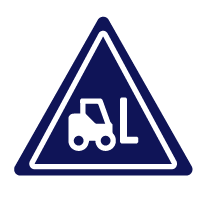
Oil Spill
CCC crews have responded to multiple coastal oil spills in its history.
- 2015: CCC crews assisted at the Refugio Beach Oil Spill in Santa Barbara County where 142,800 gallons of crude oil impacted wildlife and coastline
- 2007: Corpsmembers were trained and responded to Angel Island in the Bay Area to help with cleanup efforts following the M/V Cosco Busan Oil Spill
Logistical Support

Pest Infestation Response
Pest infestation responses, or agricultural responses, are coordinated with the California Department of Food and Agriculture (CDFA).
The CCC regularly responds to pest infestations throughout California, assisting with eradication efforts.
Some pest infestations, such as the Mediterranean fruit fly (Medfly), require CCC crews to work within residential communities- going door-to-door removing and disposing of infected fruit or performing very careful visual inspections of vegetation.
If an infestation is found, the CCC works closely with the CDFA which directs and guides crews. On several occasions, CCC crews constructed thousands of incubation containers used to trap and identify Medflies and stop their spread.
Other pest infestations that the CCC has responded to include:
- Mexican fruit fly
- Gypsy moth
- Light brown apple moth
- White fly
- Red imported fire ants
- Glassy-winged sharpshooter
- Yellow jacket
CCC crews also combat agricultural diseases. In 2003, Corpsmembers helped halt the spread of the deadly Exotic Newcastle Disease affecting all species of birds, including poultry, in Southern California. This labor intensive work required the location and removal of poultry and birds.
Pest Infestation
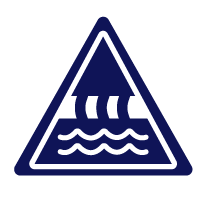
Watershed Protection
In the wake of devastating wildfires, CCC crews respond to help protect communities and the environment from household toxins and other chemicals leeching into the local watersheds. These are called watershed protection missions.
Corpsmembers may be tasked with installing straw wattles, silt socks, compost socks, sand bags, gravel bags, and other emergency protection measures. The goal is to reduce the risk that harmful contaminants may enter local creeks, rivers, and water supply systems. The EPMs filter toxins and chemicals before they enter drains or directly into waterways.
Historically, CCC crews have responded to numerous wildfire burn scars to install these measures, including:
- 2018 Camp Fire in Paradise
- 2020 LNU Lightning Complex in Lake Berryessa
- 2020 North Complex Fire in Berry Creek
- 2021 Caldor Fire in Grizzly Flats
- 2021 Dixie Fire in Greenville
- 2022 Mosquito Fire in Michigan Bluff
- 2024 Borel Fire in Havilah
- 2024 Park Fire in Chico and Cohasset
- 2025 Eaton and Palisades fire in Los Angeles County
Watershed Protection
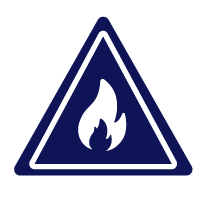
Wildfires
The CCC operates 29 hand crews in partnership with CAL FIRE and Bureau of Land Management. These 29 crews will respond to active wildfire incidents as initial attack and mop-up crews.
You can learn more about the CCC’s wildfire response on our Wildland Firefighting page.
Wildfires

Other Emergency Response Activities
The CCC has responded to numerous human-made and natural disasters and emergencies in its 50-year history. Corpsmembers have also responded to the following types of emergencies:
- Hurricane Response: CCC crews have deployed multiple times to Florida, as well as the Tri-State area, to assist local communities in recovery from hurricane and storm damage. This includes mucking and gutting homes, hazard tree removal, and tarping of properties.
- 2017: CCC responded to hurricane events in Texas, Puerto Rico, and St. Thomas.
- 2005: A CCC task force deployed to Louisiana after Hurricane Katrina
- 2018: Crews completed hazard tree and debris removal following Hurricane Michael
- 2022: Crews helped clean up homes and businesses in New Jersey following Hurricane Ian
- Oil Spill Response: CCC crews have responded to multiple coastal oil spills in its history.
- 2015: CCC crews assisted at the Refugio Beach Oil Spill in Santa Barbara County where 142,800 gallons of crude oil impacted wildlife and coastline
- 2007: Corpsmembers were trained and responded to Angel Island in the Bay Area to help with cleanup efforts following the M/V Cosco Busan Oil Spill
- Snow Removal: Heavy snowfall can be catastrophic for buildings as the weight of snow overburdens supports. CCC crews have regularly assisted in the Eastern Sierra with these efforts.
- 2021: Placer Center assisted communities impacted by the River Fire with snow removal that led to record snow fall in the area, along with power outages and road closures
- 2019: Tahoe Center Corpsmembers deployed to Mammoth Lakes to remove feet of snow off the top of schools and other important facilities
- Pandemic Response: In the wake of the COVID-19 outbreak CCC crews diverted from their regular natural resource projects to help community partners.
- 2020: Staffed food banks across California to supplant volunteer workforce unable to assist due to lockdowns
- 2021: Staffed vaccination distribution mega sites in Los Angeles and Oakland
- Recovery Work: Following the Los Angeles riots of 1992, CCC crews were deployed to help with recovery efforts.
Other Emergencies
Know Before You Go
Schedule
While dispatched to an emergency, Corpsmembers may work 16-hour days. Typical dispatches last for 16 days, including travel to and from the incident. However, crews can be deployed for a maximum of 21 days in a row.
Requirements
Corpsmembers must be willing to respond to emergencies and be dispatched for lengthy periods of time with little or no advanced notice.
Lodging
Lodging varies based on the emergency assignment. On base camp support assignments crews typically sleep in tents at the camp or in air-conditioned sleeper trailers. On some occasions crews may be put up in hotels.
Find Your Path
Work with CCC Career Navigators to chart out your path to success! CCC helps Corpsmembers leverage their skills and training to launch meaningful careers. Don’t believe us?! Hear from CCC alumni.

D. Alex Lira
Disaster Assistance Programs Specialist
California Governor’s Office of Emergency Services (Cal OES)
When D. Alex Lira joined the CCC Sacramento Center he didn’t know his CCC Path to Success would take him to our partners at the California Governor’s Office of Emergency Services, or CalOES.
In fact, Alex didn’t even know there was a CalOES. Through his work on resource crews he gained a wide variety of skills. Working with his career navigator, he expressed an interest in emergency response work and when an internship with CalOES came up, Alex got the call.
He turned that opportunity into a job where he’s continuing to serve the state and make a difference in people’s lives if and when disaster strikes.
D. Alex Lira

Elishay Taylor
Emergency Medical Technician
Cal-Med Ambulance
“Coming into the CCC as a young adult, I got to see the world from a different perspective,” said Corpsmember Shay Taylor. “I got to learn about different career paths I’d never heard of before.”
In fact, her time at CCC Fortuna and Camarillo centers, plus the Backcountry Trails Program, led Shay to become an EMT. Already in her new role, Shay is excelling in her CCC Path to Success.
She said, “I’ve found myself bringing in skills that I learned while being in the CCC such as inventory – which I learned during base camp support – lifting techniques, and effective leadership skills.”
Elishay Taylor

Edith Perez
Hazmat & HAZWOPER Technician
IQ Personnel Environmental Staffing
When Edith Perez joined the CCC San Diego Center she was looking to make a difference for herself and community. In her year in the CCC, she did everything from fuel reduction to wildland firefighting. Working on the CAL FIRE partnered fire crew was her favorite experience.
“We were as strong as the weakest link and never left anyone behind,” Edith said. “Our crew supervisor was very supportive of all of us. He always inspired us and taught us that we can reach our dreams by never giving up on ourselves.”
Edith took the lessons and challenges from the CCC and is now applying them to her new position as a Hazmat and HAZWOPER technician with IQ Personnel Environmental Staffing.
Edith Perez
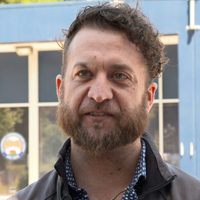
Adam Papini
Risk Management Consultant
A year in the CCC can help transform your life. Whether it’s finishing your high school diploma or finding a career you never thought of before.
CCC Tahoe and CCC Sacramento alum Adam Papini credits his time in the CCC with accomplishing both. A single training has led Adam into a career as a risk management consultant.
It’s a training many people may not have heard about, Hazardous Waste Operations and Emergency Response, but one that’s led Adam to a story of success.
Adam Papini
Explore our locations
All CCC centers respond to emergencies across California and have the potential to respond to emergencies out-of-state.
Camarillo Center
All Corpsmembers at Camarillo Center may be dispatched to assist on emergencies. The center’s four fire crews primarily respond to wildfire incidents. The center’s resource crew primarily provide base camp support. The center’s culinary crew could also be called upon to cook for larger groups or assist other centers.
Chico Center
All Corpsmembers at Chico Center may be dispatched to assist on emergencies. The center’s crews primarily provide base camp support, but may also respond to floods, watershed protection, and other disasters.
Delta Center
All Corpsmembers at Delta Center may be dispatched to assist on emergencies. The center’s two fire crews respond to wildfire incidents across its region and state. Other crews primarily provide base camp support, but may also respond to floods, watershed protection, and other disasters. The center’s culinary crew could also be called upon to cook for larger groups or assist other centers.
Fortuna Center
All Corpsmembers at Fortuna Center may be dispatched to assist on emergencies. The center’s fire crew responds to wildfire incidents across its region and state. Other crews primarily provide base camp support, but may also respond to floods, watershed protection, and other disasters. The center’s culinary crew could also be called upon to cook for larger groups or assist other centers.
Fresno Center
All Corpsmembers at Fresno Center may be dispatched to assist on emergencies. The center’s fire crew responds to wildfire incidents across its region and the state. Other crews primarily provide base camp support, but may also respond to floods, watershed protection, and other disasters.
Inland Empire Center
All Corpsmembers at Inland Empire Center may be dispatched to assist on emergencies. The center’s fire crew responds to wildfire incidents across the Inland Empire and state. Other crews primarily provide base camp support, but may also respond to floods, watershed protection, and other disasters.
Los Angeles Center
All Corpsmembers at Los Angeles Center may be dispatched to assist on emergencies. The center’s crews primarily provide base camp support, but may also respond to floods, watershed protection, and other disasters.
Los Padres Center
All Corpsmembers at Las Padres Center may be dispatched to assist on emergencies. The center’s two fire crews respond to wildfire incidents across its region and state. Other crews primarily provide base camp support, but may also respond to floods, watershed protection, and other disasters. The center’s culinary crew could also be called upon to cook for larger groups or assist other centers.
Los Piños Center
All Corpsmembers at Los Piños Center may be dispatched to assist on emergencies. The center’s four fire crews primarily respond to wildfire incidents. The center’s culinary crew could also be called upon to cook for larger groups or assist other centers.
Magalia Fire Center
All Corpsmembers at Magalia Fire Center may be dispatched to assist on emergencies. The center’s four fire crews primarily respond to wildfire incidents. The center’s culinary crew could also be called upon to cook for larger groups or assist other centers.
Mendocino Center
All Corpsmembers at Mendocino Center may be dispatched to assist on emergencies. The center’s two fire crews respond to wildfire incidents across its region and state. Other crews primarily provide base camp support, but may also respond to floods, watershed protection, and other disasters. The center’s culinary crew could also be called upon to cook for larger groups or assist other centers.
Monterey Bay Center
All Corpsmembers at Monterey Bay Center may be dispatched to assist on emergencies. The center’s fire crew responds to wildfire incidents across the Central Coast and state. Other crews primarily provide base camp support, but may also respond to floods, watershed protection, and other disasters.
Norwalk Center
All Corpsmembers at Norwalk Center may be dispatched to assist on emergencies. The center’s crews primarily provide base camp support, but may also respond to floods, watershed protection, and other disasters.
Placer Center
All Corpsmembers at Placer Center may be dispatched to assist on emergencies. The center’s two fire crews respond to wildfire incidents across its region and state. Other crews primarily provide base camp support, but may also respond to floods, watershed protection, and other disasters. The center’s culinary crew could also be called upon to cook for larger groups or assist other centers.
Pomona Center
All Corpsmembers at Pomona Center may be dispatched to assist on emergencies. The center’s fire crew responds to wildfire incidents across the Inland Empire and state. Other crews primarily provide base camp support, but may also respond to floods, watershed protection, and other disasters.
Redding Center
All Corpsmembers at Redding Center may be dispatched to assist on emergencies. The center’s fire crew responds to wildfire incidents across the Northstate and California. Other crews primarily provide base camp support, but may also respond to floods, watershed protection, and other disasters.
Sacramento Center
All Corpsmembers at Sacramento Center may be dispatched to assist on emergencies. The center’s crews primarily provide base camp support, but may also respond to floods, watershed protection, and other disasters.
Salinas Center
All Corpsmembers at Salinas Center may be dispatched to assist on emergencies. The center’s crews primarily provide base camp support, but may also respond to floods, watershed protection, and other disasters.
San Diego Center
All Corpsmembers at San Diego Center may be dispatched to assist on emergencies. The center’s fire crew responds to wildfire incidents across SoCal and the state. Other crews primarily provide base camp support, but may also respond to floods, watershed protection, and other disasters.
Santa Maria Center
All Corpsmembers at Santa Maria Center may be dispatched to assist on emergencies. The center’s crews primarily provide base camp support, but may also respond to floods, watershed protection, and other disasters.
Siskiyou Center
All Corpsmembers at Siskiyou Center may be dispatched to assist on emergencies. The center’s crews primarily provide base camp support, but may also respond to floods, watershed protection, and other disasters.
Solano Center
All Corpsmembers at Solano Center may be dispatched to assist on emergencies. The center’s crews primarily provide base camp support, but may also respond to floods, watershed protection, and other disasters.
Tahoe Center
The Tahoe Center is located in the El Dorado County community of Meyers, adjacent to South Lake Tahoe. The center employs civil service staff in the following classifications (subject to change):
- Administrative Officer 2
- Associate Governmental Program Analyst
- Conservationist 1
- Conservationist 2
- Conservationist Supervisor
- Cook Specialist 2
- Maintenance Mechanic
- Management Services Technician
- Office Technician
- Staff Services Manager 2
- Supervising Cook 1
Address:
1949 Apache Ave.
South Lake Tahoe, CA 96150
Vista Center
All Corpsmembers at Vista Center may be dispatched to assist on emergencies. The center’s crews primarily provide base camp support, but may also respond to floods, watershed protection, and other disasters.
Ask Us Anything
We know you have questions about emergency dispatched. Here are some of the common one’s we get. Have more questions? Give us a call!
Talk to A Recruiter
How often do Corpsmembers get sent out on emergency?
It depends. When there is a significant fire season and multiple, on-going incidents Corpsmembers can be regularly dispatched to emergency assignments. The most common assignment is for base camp support.
How much notice do Corpsmembers receive before getting dispatched?
Emergencies are usually unplanned events that require an urgent response. CCC Corpsmembers may get less than 24 hours notice before needing to leave for an emergency assignment. Most centers have Corpsmembers prepare ready bags in case of an immediate dispatch need.
Corpsmembers are expected to be able to deploy quickly when requested and may be required to come back to the office within 24 hours if dispatches are on the weekends, holidays, or off-hours.
Will I get paid for working overtime?
Yes, Corpsmembers can receive excess pay when on emergency assignments. Excess pay is accrued when a Corpsmember works greater than 40-hours in a week and more than a standard 8 or 10-hour day. Learn more about excess pay on the Stipend, Scholarships, & Supplies page.
Does CCC offer childcare support when non-res centers get dispatched?
No, at this time CCC does not offer childcare support. Staff may be able to assist with referrals to other state or local agencies. Corpsmembers must make their own childcare arrangements when dispatched to emergencies.
REad Our NEws
CCC crews have been working with CDFA to help stop the spread of Med Fly in Alameda County.
In the wake of the Palisades and Eaton wildfires, 26 crews from the California Conservation Corps — plus six more from certified local corps across the state — came together to help the Los Angeles community.
Fresh from initial training — if even fully finishing — CCC Pomona and CCC San Diego Corpsmembers were among the dozens who supported the Eaton Fire Base Camp.
Corpsmembers installed more than 6,000 linear feet of silt fencing to protect toxins from directly entering Pacific Ocean in Malibu.

